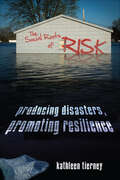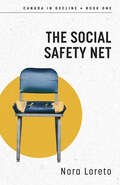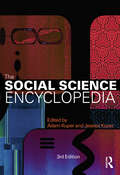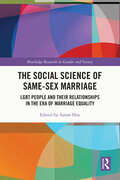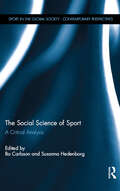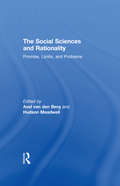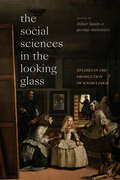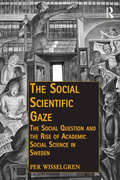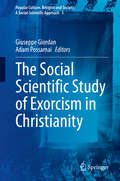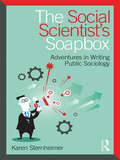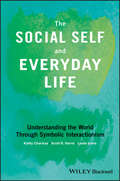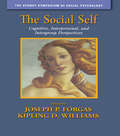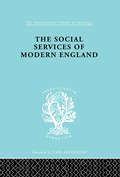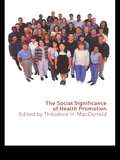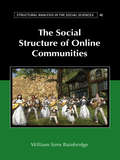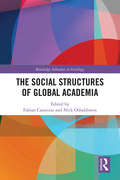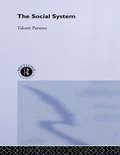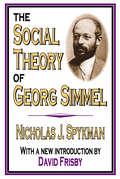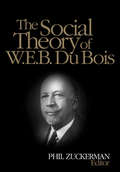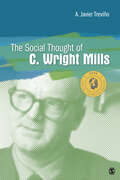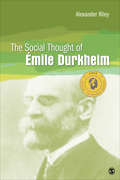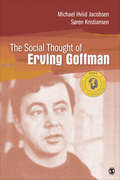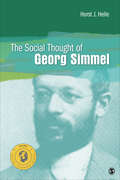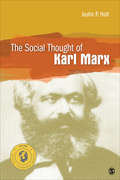- Table View
- List View
The Social Roots of Risk: Producing Disasters, Promoting Resilience (High Reliability and Crisis Management)
by Kathleen TierneyThe first decade of the 21st century saw a remarkable number of large-scale disasters. Earthquakes in Haiti and Sumatra underscored the serious economic consequences that catastrophic events can have on developing countries, while 9/11 and Hurricane Katrina showed that first world nations remain vulnerable. The Social Roots of Risk argues against the widespread notion that cataclysmic occurrences are singular events, driven by forces beyond our control. Instead, Kathleen Tierney contends that disasters of all types#151;be they natural, technological, or economic#151;are rooted in common social and institutional sources. Put another way, risks and disasters are produced by the social order itself#151;by governing bodies, organizations, and groups that push for economic growth, oppose risk-reducing regulation, and escape responsibility for tremendous losses when they occur. Considering a wide range of historical and looming events#151;from a potential mega-earthquake in Tokyo that would cause devastation far greater than what we saw in 2011, to BP's accident history prior to the 2010 blowout#151;Tierney illustrates trends in our behavior, connecting what seem like one-off events to illuminate historical patterns. Like risk, human resilience also emerges from the social order, and this book makes a powerful case that we already have a significant capacity to reduce the losses that disasters produce. A provocative rethinking of the way that we approach and remedy disasters, The Social Roots of Risk leaves readers with a better understanding of how our own actions make us vulnerable to the next big crisis#151;and what we can do to prevent it.
The Social Safety Net: Canada in Decline Book One (Canada in Decline #1)
by Nora LoretoCanada’s social safety net is fraying. Why does it feel like everything is collapsing?Canada is at a crossroad. Neoliberalism has hollowed out and sold off the social services Canadians rely on now more than ever, and has brought into stark relief the dissonance among colonial, Indigenous, and some of Canada's most at-risk groups.The Social Safety Net tracks the forty-year attack on Canada’s social safety net. As neoliberalism has matured in Canada, Canadians are seeing the impact of these attacks: unreliable health services, crises in education and social services, and a society that feels like it is losing cohesion.The first volume in a series by activist, author, and journalist Nora Loreto, the Canada in Decline series is the story of Canada’s untenable status quo and the forces that have led us to where we are today. It outlines the choices we need to make as well as the possible paths forward to fix all that is crumbling around us.
The Social Science Encyclopedia
by Adam Kuper Jessica KuperThe Social Science Encyclopedia, first published in 1985 to acclaim from social scientists, librarians and students, was thoroughly revised in 1996, when reviewers began to describe it as a classic. This third edition has been radically recast. Over half the entries are new or have been entirely rewritten, and most of the balance have been substantially revised.Written by an international team of contributors, the Encyclopedia offers a global perspective on key issues within the social sciences. Some 500 entries cover a variety of enduring and newly vital areas of study and research methods. Experts review theoretical debates from neo-evolutionism and rational choice theory to poststructuralism, and address the great questions that cut across the social sciences. What is the influence of genes on behaviour? What is the nature of consciousness and cognition? What are the causes of poverty and wealth? What are the roots of conflict, wars, revolutions and genocidal violence?This authoritative reference work is aimed at anyone with a serious interest in contemporary academic thinking about the individual in society.
The Social Science of Same-Sex Marriage: LGBT People and Their Relationships in the Era of Marriage Equality (Routledge Research in Gender and Society)
by Aaron HoyShowcasing research from across the social sciences, this edited volume seeks to provide readers with an empirically grounded sense of how many lesbian, gay, bisexual, and transgender (LGBT) people marry in the US and Canada, what their marriages look like, and how LGBT people themselves are impacted by marriage and marriage equality. Prior to marriage equality, lawmakers and activists across the political spectrum debated whether same-sex couples should have the legal right to marry, and likewise, academic research to date has focused mostly on the politics of same-sex marriage. However, this edited volume focuses on LGBT people themselves and their intimate relationships in the era of marriage equality. Including both quantitative and qualitative social science research, it features 14 primary chapters that examine a diverse set of topics, including demographic patterns in same-sex marriage and cohabitation, marital aspirations and motivations among LGBT people, arrangements and dynamics within same-sex relationships, and the legal benefits and informal privileges associated with marriage. The edited volume will be of interest to scholars across a wide range of disciplines, including sociology, psychology, child and family studies, communications, social work, and economics, while also offering valuable information for laypeople generally interested in families and/or LGBT studies.
The Social Science of Sport: A Critical Analysis (Sport in the Global Society – Contemporary Perspectives)
by Bo Carlsson and Susanna HedenborgIn this book questions about definitions and demarcations of sport science are discussed. Not the least the many normative ideas of sport as good or as bad are problematized in relation to the academic field. These ideas permeate sport science in ways that are not seen in other academic fields like history, sociology or law. In addition, if and if so, in what ways sport science influence social science in general. Does sport science bring new questions in relation to issues like "what makes a society possible" or "what is a human being"?This book was published as a special issue of Sport in Society.
The Social Sciences and Rationality: Promise, Limits, and Problems
by Hudson MeadwellIn recent decades, rational choice theory has emerged as the single most powerful, controversial claimant to provide a unified, theoretical framework for all the social sciences. In its simplest form, the theory postulates that humans are purposive beings who pursue their goals in a rational, efficient manner, seeking the greatest benefit at the lowest cost. This volume brings together prominent scholars working in several social science disciplines and the philosophy of science to debate the promise and problems of rational choice theory.As rational choice theory has spread from its home base in economics to other disciplines, it has come under fierce criticism. To its critics, the extension of the explanatory model mistakenly assumes that the logic of economic rationality can explain non-economic behavior and, at its worst, commits the ethnocentric error of imposing Western concepts of rationality on non-Western societies and cultures. This volume includes strong advocates as well as forceful critics of the rational choice approach. However, in contrast to previous debates, all the contributors share a commitment to open, constructive and knowledgeable dialogue. Well-known advocates of rational choice theory (Michael Hechter, Michael Smith, Chris Manfredi) explicitly ponder some of its serious limitations, while equally well-known critics (Ian Shapiro, Mario Bunge) strike a surprisingly conciliatory tone in contemplating its legitimate uses. Vociferous critics of neoclassical economics (Bunge) favorably discuss sociological proponents of rational choice theory while two economists who are not particularly anti-mainstream (Robin Rowley, George Grantham) critically assess the problems of such assumptions in their discipline. Philosophers (Storrs McCall) and sociologists (John Hall) alike reflect on the variable meaning of rationality in explaining social behavior. In the introduction and conclusion, the editors survey the current state of the debate and show how open, constructive dialogue enables us to move beyond hackneyed accusations and dismissals that have characterized much previous debate.
The Social Sciences in the Looking Glass: Studies in the Production of Knowledge
by Didier Fassin and George SteinmetzIn recent years, social scientists have turned their critical lens on the historical roots and contours of their disciplines, including their politics and practices, epistemologies and methods, institutionalization and professionalization, national development and colonial expansion, globalization and local contestations, and public presence and role in society. The Social Sciences in the Looking Glass offers current social scientific perspectives on this reflexive moment. Examining sociology, anthropology, philosophy, political science, legal theory, and religious studies, the volume’s contributors outline the present transformations of the social sciences, explore their connections with critical humanities, analyze the challenges of alternate paradigms, and interrogate recent endeavors to move beyond the human. Throughout, the authors, who belong to half a dozen disciplines, trace how the social sciences are thoroughly entangled in the social facts they analyze and are key to helping us understand the conditions of our world.Contributors. Chitralekha, Jean-Louis Fabiani, Didier Fassin, Johan Heilbron, Miriam Kingsberg Kadia, Kristoffer Kropp, Nicolas Langlitz, John Lardas Modern, Álvaro Morcillo Laiz, Amín Pérez, Carel Smith, George Steinmetz, Peter D. Thomas, Bregje van Eekelen, Agata Zysiak
The Social Scientific Gaze: The Social Question and the Rise of Academic Social Science in Sweden (Public Intellectuals and the Sociology of Knowledge)
by Per WisselgrenThe social sciences have, ever since they were first established as academic disciplines, played a foundational role in most spheres of modern society - in policy-making, education, the media and public debate - and hence also, indirectly, for our self-understanding as social beings. The Social Scientific Gaze examines the discursive formation of academic social science in the historical context of the 'social question', that is, the protracted and wide-ranging discussions on the social problems of modernity that were being debated with increased intensity during the nineteenth century. Empirically, the study focuses on the Lorén Foundation, a combined private funding agency and early research institute, which was set up in 1885 to promote the rise of Swedish social science and to investigate the social question. Comprising an heuristic case, the close analysis of the Foundation makes it possible not only to reconstruct its basic ideas and practices, but also to situate its activities in broader historical and sociological context. The Social Scientific Gaze argues that the rise of Swedish social science may be seen not only as an 'answer' to the social 'question', but also as one attempt alongside others - including contemporary social literature, the philantropic reform movement, and the introduction of modern social policy - to conceptualize, mobilize and regulate the social sphere. In this process it is furthermore shown how an ambigious yet distinct 'social scientific gaze' was discursively articulated.
The Social Scientific Study of Exorcism in Christianity (Popular Culture, Religion and Society. A Social-Scientific Approach #3)
by Giuseppe Giordan Adam PossamaiThis book presents an academic analysis of exorcism in Christianity. It not only explores the crisis and drama of a single individual in a fight against demonic possession but also looks at the broader implications for the society in which the possessed lives. In recognition of this, coverage includes case studies from various geographical areas in Europe, North and South America, and Oceania. The contributors explore the growing significance of the rite of exorcism, both in its more structured format within traditional Christian religions as well as in the less controlled and structured forms in the rites of deliverance within Neopentecostal movements. They examine theories on the interaction between religion, magic, and science to present new and groundbreaking data on exorcism. The fight against demonic possession underlines the way in which changes within the religious field, such as the rediscovery of typical practices of popular religiosity, challenge the expectations of the theory of secularization. This book argues that if possession is a threat to the individual and to the equilibrium of the social order, the ritual of exorcism is able to re-establish a balance and an order through the power of the exorcist. This does not happen in a social vacuum but in a consumer culture where religious groups market themselves against other faiths. This book appeals to researchers in the field.
The Social Scientist's Soapbox: Adventures in Writing Public Sociology
by Karen SternheimerWhether your goal is to share little-known or misunderstood information, work to create policy changes, or raise awareness about a pressing social issue, this book will help you start communicating with the public and share your research with a broader audience. Using examples from social scientists who have successfully navigated the public sphere, as well as firsthand accounts of the ups and downs of the writing, publishing, and promoting process, The Social Scientist’s Soapbox: Adventures in Writing Public Sociology presents readers with a step-by-step guide to get started, stay motivated, and complete both large and small writing projects for public audiences. Now, more than ever, social scientists need to share our ideas with the public, as misinformation, disinformation, and outright lies have filtered into the public discourse and policymaking.
The Social Self and Everyday Life: Understanding the World Through Symbolic Interactionism
by Kathy Charmaz Leslie Irvine Scott R. HarrisAn engaging text that enables readers to understand the world through symbolic interactionism This lively and accessible book offers an introduction to sociological social psychology through the lens of symbolic interactionism. It provides students with an accessible understanding of this perspective to illuminate their worlds and deepen their knowledge of other people’s lives, as well as their own. Written by noted experts in the field, the book explores the core concepts of social psychology and examines a collection of captivating empirical studies. The book also highlights everyday life—putting the focus on the issues and concerns that are most relevant to the readers’ social context. The Social Self and Everyday Life bridges classical theories and contemporary ideas, joins abstract concepts with concrete examples, and integrates theory with empirical evidence. It covers a range of topics including the body, emotions, health and illness, the family, technology, and inequality. Best of all, it gets students involved in applying concepts in their daily lives. Demonstrates how to use students’ social worlds, experiences, and concerns to illustrate key interactionist concepts in a way that they can emulate Develops key concepts such as meaning, self, and identity throughout the text to further students’ understanding and ability to use them Introduces students to symbolic interactionism, a major theoretical and research tradition within sociology Helps to involve students in familiar experiences and issues and shows how a symbolic interactionist perspective illuminates them Combines the best features of authoritative summaries, clear definitions of key terms, with enticing empirical excerpts and attention to popular ideas Clear and inviting in its presentation, The Social Self and Everyday Life: Understanding the World Through Symbolic Interactionism is an excellent book for undergraduate students in sociology, social psychology, and social interaction.
The Social Self: Cognitive, Interpersonal and Intergroup Perspectives (Sydney Symposium of Social Psychology #Vol. 4)
by Kipling D. Williams Joseph P. ForgasWhat is the nature of the 'self', how do everyday experiences shape it, and how does it influence our thinking, judgements and behaviors? Such questions constitute enduring puzzles in psychology, and are also of critical practical importance for applied domains such as clinical, counseling, educational and organizational psychology. In this book a select group of eminent international researchers survey the most recent advances in research of the self. In particular, they discuss the influence of cognitive and intra-psychic processes (Part 1), interpersonal and relational variables (Part 2), and inter-group phenomena on the self (Part 3).
The Social Services of Modern England (International Library of Sociology)
by M. Penelope HallFirst Published in 1998. Routledge is an imprint of Taylor & Francis, an informa company.
The Social Significance of Health Promotion
by Théodore H. MacDonaldThe Social Significance of Health Promotion sets health promotion in its historical context and delineates its contemporary role. It explores the potential of health promotion to impact on our social values and sense of community. The book begins by exploring the historical roots of health promotion and its relationship to the medical model of health. It moves on to present analyses of contemporary health promotion programmes in which the contributors are actively engaged. These chapters discuss current questions for health promotion from a practitioner perspective and from the point of view of their social impact. They cover a wide range of topical issues such as exclusion and inclusion, the mental health of children, the role of alternative medicine, and health in the workplace.Emphasising the centrality of empowerment, participation and advocacy to an effective health promotion programme, The Social Significance of Health Promotion brings students and health professionals right up to date with the latest initiatives and theories.
The Social Structure of Online Communities (Structural Analysis in the Social Sciences)
by William Sims BainbridgeWith great potential benefit and possible harm, online social media platforms are transforming human society. Based on decades of deep exploration, distinguished scholar William Sims Bainbridge surveys our complex virtual society, harvesting insights about the future of our real world. Many pilot studies demonstrate valuable research methods and explanatory theories. Tracing membership interlocks between Facebook groups can chart the structure of a social movement, like the one devoted to future spaceflight development. Statistical data on the roles played by people in massively multiplayer online games illustrate the Silicon Law: information technology energizes both freedom and control, in a dynamic balance. The significance of open-source software suggests the traditional distinction between professional and amateur may fade, whereas web-based conflicts between religious and political groups imply that chasms are opening in civil society. This analysis of online space and the divergent communities is long overdue.
The Social Structures of Global Academia (Routledge Advances in Sociology)
by Nick Osbaldiston Fabian CannizzoHigher education and research are now at the centre of economic and social policy in advanced information societies. Global networks of researchers, finance, students and policymakers invoke collaborative sociological perspectives. What it means to be an academic and to work in a technologically advanced knowledge industry has undergone transformations that cross national borders. The future of knowledge production, social development, prosperity and the freedom of ideas are caught in the swelling of global tides. The Social Structures of Global Academia exposes readers to a variety of issues that are impacting academics across the globe. The volume includes contributions by leading social scientists and innovative research from emerging scholars. Its anchoring themes include academic ethics, the affective cultures of scholarship, changing funding structures and social control of the currents of scholarly life. Giving readers an overview of the growing field of critical studies of academia, The Social Structures of Global Academia will appeal to students and scholars seeking to understand more of the burgeoning field of critical sociologies of higher education, and general readers interested in contemporary knowledge about universities, science and the people who make it their passion. It will also appeal to policymakers who are invested in trying to make universities more viable places to work.
The Social System
by Talcott ParsonsThis book brings together, in systematic and generalized form, the main outlines of a conceptual scheme for the analysis of the structure and processes of social systems. It carries out Pareto's intention by using the "structural-functional" level of analysis.
The Social Theory of Georg Simmel
by Nicholas J. SpykmanContemporary sociology increasingly seems to be adopting a perspective similar to that on which Georg Simmel's analysis and interpretations rested. To a significant degree, therefore, sociologists continue to turn to Simmel for a basic understanding of the forms and processes of social life. Nicholas Spykman's The Social Theory of Georg Simmel, originally published in 1925, was the first comprehensive account of Simmel's ideas. It remains a most valuable summary of the major elements of his thought.Spykman wrote this study for a specific purpose: to indicate Simmel's conception of the relations between different fields of theoretic inquiry into socio-historical actuality; to make Simmel's contributions to the methodology of the social sciences understood; and to illustrate Simmel's conception of sociology as a science. He shows that Simmel was primarily a social philosopher interested in a functional understanding of socio-historical realities, art and economic values, morals and aesthetics, religion, and the function of money. Spykman identifies three major phases in the development of Simmel's thought: the first is primarily occupied with methodology and the presuppositions of the social sciences; during the second he wrote several essays containing philosophic interpretations of modern civilization; and the third culminated in his metaphysics of culture.The Social Theory of Georg Simmel, graced with a new introduction by David Frisby, one of the foremost contemporary Simmel experts, is an outstandingly organized, coherent presentation of the complex and subtle ideas of one of the intellectual giants of modern sociology.
The Social Theory of W.E.B. Du Bois
by Dr Philip ZuckermanW. E. B. Du Bois was a political and literary giant of the 20th century, publishing over twenty books and thousands of essays and articles throughout his life. In The Social Theory of W. E. B. Du Bois, editor Phil Zuckerman assembles Du Bois's work from a wide variety of sources, including articles Du Bois published in newspapers, speeches he delivered, selections from well-known classics such as The Souls of Black Folk and Darkwater, and lesser-known, hard-to-find material written by this revolutionary social theorist. This book offers an excellent introduction to the sociological theory of one of the 20th century's intellectual beacons.
The Social Thought of C. Wright Mills (Social Thinkers Series)
by A. Javier TrevinoAn accessible introduction to the social and political thought of one of the leading critics of mid-twentieth century American societyThis inaugural volume of the Pine Forge Press Social Thinkers series provides a concise introduction to the work, life, and influences of C. Wright Mills. Accessible and provocative, this book closely examines the writings and ideas of C. Wright Mills that now, over half a century later, remain crucial in better understanding today′s world. The book′s primary focus is on two of his lifelong intellectual concerns: the interrelationship between social structure and personality and the bureaucratization of modern society and the power relations it produces. The book is ideal for use as a self-contained volume or in conjunction with sociological theory textbooks.
The Social Thought of Emile Durkheim
by Alexander T. RileyThis new volume of the SAGE Social Thinkers series provides a concise introduction to the work, life, and influences of Émile Durkheim, one of the informal “holy trinity” of sociology’s founding thinkers, along with Weber and Marx. The author shows that Durkheim’s perspective is arguably the most properly sociological of the three. He thought through the nature of society, culture, and the complex relationship of the individual to the collective in a manner more concentrated and thorough than any of his contemporaries during the period when sociology was emerging as a discipline.
The Social Thought of Erving Goffman (Social Thinkers Series)
by Michael Hviid Jacobsen Soren KristiansenPart of the SAGE Social Thinker series, this book serves as a concise and inviting introduction to the life and works of Erving Goffman, one of the most prominent social theorists in postwar sociology. Goffman’s ideas continue to influence scholars in various fields and have also attracted many readers outside conventional academia. Goffman’s overall research agenda was the exploration of what he termed the interaction order—that is, the micro social order that regulates the co-mingling of people in each other’s immediate presence. He coined several new concepts (face-work, impression management, role distance, civil inattention, etc.) with which to grasp and understand the complexities and basic social restructuring of everyday life, many of which are now part of sociology’s standard vocabulary.
The Social Thought of Erving Goffman (Social Thinkers Series)
by Michael Hviid Jacobsen Soren KristiansenPart of the SAGE Social Thinker series, this book serves as a concise and inviting introduction to the life and works of Erving Goffman, one of the most prominent social theorists in postwar sociology. Goffman’s ideas continue to influence scholars in various fields and have also attracted many readers outside conventional academia. Goffman’s overall research agenda was the exploration of what he termed the interaction order—that is, the micro social order that regulates the co-mingling of people in each other’s immediate presence. He coined several new concepts (face-work, impression management, role distance, civil inattention, etc.) with which to grasp and understand the complexities and basic social restructuring of everyday life, many of which are now part of sociology’s standard vocabulary.
The Social Thought of Georg Simmel
by Horst J. HelleThis new volume of the SAGE Social Thinkers series, The Social Thought of Georg Simmel provides a concise introduction to the work, life, and influences of Georg Simmel. Horst J. Helle closely examines the writings and ideas of Simmel that introduced a new way of looking at culture and society and helped establish sociology’s place among the academic fields. The book focuses on the key intellectual concerns of Simmel, including the process of individualization, religion, private and family life, cities, and modernization. It is ideal for use as a self-contained volume or in conjunction with other sociological theory books.
The Social Thought of Karl Marx (Social Thinkers Series)
by Justin P. HoltPart of the SAGE Social Thinkers series, this brief and clearly-written book provides a concise introduction to the work, life, and influences of Karl Marx, one of the most revered, reviled, and misunderstood figures in modern history. The book serves as an excellent introduction to the full range of Marx’s major themes—alienation, economics, social class, capitalism, communism, materialism, environmental sustainability—and considers the extent to which they are relevant today. It is ideal for use as a self-contained volume or in conjunction with other sociological theory textbooks.
